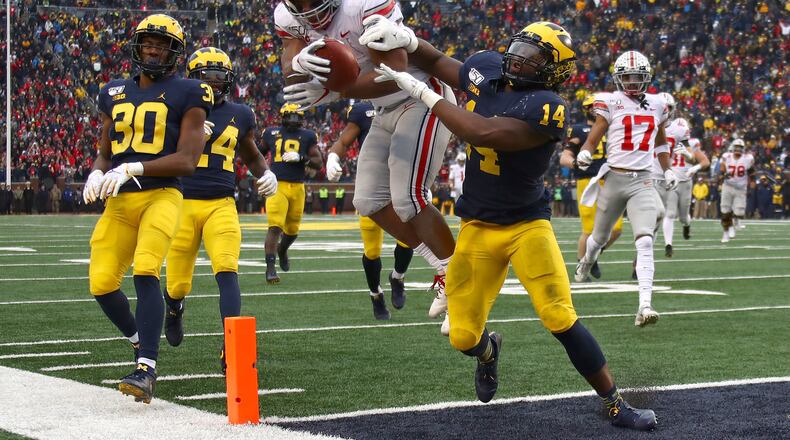The last time the Ohio State-Michigan series was only separated by six games was after a 40-0 Michigan win in 1905, the year before the forward pass was legalized https://t.co/vImHDXxsz6
— Marcus Hartman (@marcushartman) December 1, 2019
- Justin Fields said Ohio State beats Michigan consistently because Michigan doesn't take the rivalry as seriously as Ohio State. Sometimes players say stuff like this without having a good frame of reference, and it doesn't mean anything. Fields cited conversations with guys on the team, though, and I tend to think there's a lot of evidence out there that indicates this is true.
- Attitude toward the rivalry does not fully explain Ohio State winning 17 of the last 19, but it probably is a factor in Ohio State being as dominant as it has been, both in terms of deciding a close game here or there and turning some games that perhaps should be close into blowouts (like the past two years).
- I've been going to Big Ten Media Days since 2006, and just about every year I or someone else asks players and coaches from both sides of the rivalry about it, and the answers invariably are the same despite a combined five coaching changes. Ohio State treats Michigan like a one-game season while Michigan players and coaches always deliver some variation of, "Beating the Buckeyes is important, but we treat every game the same." They also cite the Michigan State rivalry (and sometimes Notre Dame) as equally important as Ohio State while generally blowing off the idea attitude toward The Game is important. Maybe that doesn't matter, but the results are the results.
- That said, the talent disparity is real — small but potentially differentiating. Certainly enough to be exploited by better strategy, development and motivation.
- Rankings vary a bit from service to service, but Ohio State has had the No. 1 recruiting class in the Big Ten 11 times since 2002 with an average ranking of about 1.5 while Michigan has had the No. 1 class in the conference five times with an average ranking of 2.4. Ohio State's average national ranking is about 8 while Michigan's is 12. Since 2013 (Urban Meyer's first full-year recruiting class), the numbers have shifted more in Ohio State's favor (1.3 to 3 in the Big Ten and 4.8 to 14 nationally).
- Of course, some superior Ohio State teams lost to Michigan in the 1990s, and taking the rivalry seriously enough in the John Cooper era was a problem for Ohio State right up until the Buckeyes started taking it too seriously. This might be something we just use to justify success (or lack thereof), but I always felt Jim Tressel's approach helped Ohio State play well in The Game without overthinking it. And now Ryan Day is carrying on the things Tressel and Meyer did.
- I mentioned this at the end of a post like this in September after Michigan got rocked by Wisconsin, but if you want to find one issue that has transcended multiple Michigan coaching tenures and now nearly two decades it would be a lack of player development. The Badgers and Michigan State both recruit at a level below Michigan but have been much more successful over the past 15 years, and that is because the product coming out doesn't seem to be as good as the material going into the football facility in Ann Arbor. (Wisconsin and MSU also have better records against Ohio State than Michigan since 2001, but then so does Purdue.)
- That began at the end of the Lloyd Carr era, which overlapped with the beginning of the Tressel era. I don't think this is a coincidence because Tressel scrambled Michigan's recruiting plans by getting a greater percentage of the best players in Ohio, especially in the northeast where Michigan had gotten star players for years. Carr kept bringing in good classes (typically ranked higher than Tressel's), but they included more national recruits and ended up having a higher bust rate, which again I think is not a coincidence. Recruiting on a national scope is necessary to develop a national championship-caliber roster, but there is a balance to strike between having a roster full of mercenaries looking out for No. 1 and a group of stars and role players who can meld into a great team.
- To me, Tressel broke Michigan because the problems from the end of the Carr era have never been fixed, and a lack of consistency since then has hindered the healing process. Rich Rodriguez and Brady Hoke were both questionable hires who played their hands badly early by misusing their talent and were fired before getting a chance to correct their mistakes. Hoke left a better base for Harbaugh, and Harbaugh actually overachieved the first couple of years. But he's been unable to manage his staff with any consistency and the on-field product has gotten worse instead of better even as the talent level is supposed to be higher than it was when he arrived.
- Calling the regular season a playoff is factually inaccurate and intellectually dishonest. If you don't want the playoff to expand, that's fine. Just don't lie about the current system to try to defend it. This week at least one team will almost certainly be eliminated despite winning (Utah or the Big 12 champ), and there is also a very real possibility two teams could be eliminated despite winning while another stays in despite losing (if Georgia beats LSU). That's without even getting into the scenarios if Ohio State or Clemson lose, so spare me the rhetoric and come up with a better argument if you don't want the playoff to reach its optimal numbers of teams (eight). READ MORE: College Football Playoff: Which contenders have best wins, worst losses
- Since I have been dogging the Bengals and their new coach and old quarterback all season, it would be pretty lame of me to ignore their first actually positive moment of the season. Not only did they beat the New York Jets 22-6, the men in stripes dominated most of the afternoon. They looked like a real NFL team and everything! Being able to avoid joining that 0-16 club (hey, there's something else to hold over the Browns besides actually having been to the Super Bowl) is undoubtedly a good thing, and two of the teams in the running for the top pick also won so the damage to their chances of getting the No. 1 overall pick was minimal. The Giants are now a threat, but they won't be drafting a quarterback so falling behind them might not be a disaster if the Bengals really want Joe Burrow.
- Perhaps Zac Taylor was right all along and this really is a sign. Time will tell. Although I remain a skeptic, not having to start over would obviously be better for all involved than having to start over again if he flames out right away, and I've been wrong before!
- For all the fanfare of his return, Andy Dalton posted a league average QB rating, throwing a touchdown pass and avoiding disaster the way one would hope a promising rookie might but not taking charge of the game the way a franchise quarterback would.
- Ironically, the defense was so good they probably would have won even if Ryan Finley started, and that's the biggest story of the day. After some shockingly bad performances over the past two seasons, the unit has shown some signs of life. If that actually becomes a trend, the team could enter the offseason with a lot more to feel good about because there would be a lot less to fix.
- The Bengals still need a long-term quarterback who is better than Andy Dalton even if they decide to keep him for next season, which might be a better idea than signing a care-taker QB for around the same salary he will get while developing a future signal-caller.
- Don't look now, but the economics of baseball seem to have finally smiled on the Reds: In the past, Mike Moustakas probably would have signed a huge contract with a big-market team two years ago and never been on the open market this winter so that they could bring him in to hopefully stabilize second base and hit some taters for the next four years.
“Marcus Musings” is a semi-regular feature here at the blog. While most of our other coverage is concentrated on news and analysis, this is a place to share opinions on various stories permeating the sports world and (hopefully) have some fun. Have your own thoughts? Send them along to marcus.hartman@coxin.com or find us on Twitter or Facebook.
About the Author

